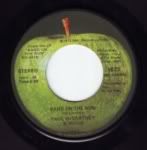Post by gremashlo on Jul 28, 2009 8:22:12 GMT -5
"Every Christian Lion-Hearted Man Will Show You"--flipside of "Holiday", ATCO Records
The Bee Gees in the1960’s were blatantly marketed as a successor to the Beatles—their manager and producer, Robert Stigwood, was in fact a “flunky” of Brian Epstein, the Fab 4’s manager. (When Epstein died, Stigwood attempted to claim control of the Beatles. John Lennon responded that if Stigwood was to be their manager, they would record nothing but off-key versions of “God Save The Queen”. But, I digress.)
The Bee Gees (British expatriates as children) returned to England in 1967, determined to conquer their homeland after dominating the Aussie charts. What resulted was the album, “Bee Gees 1st”, which wound up a world-wide smash and spawned three top 20 hits, “New York Mining Disaster 1941”, “To Love Somebody”, and “Holiday”. The surprising element was their youth—Barry was 20, while Maurice and Robin were 18—and their formidable musical talents as performers and composers.
Which brings us to “Every Christian Lion Hearted Man Will Show You”. The flipside to “Holiday” (while a nice tune--it did reach #16 in the US--it is forgettable) starts off with a mellotron drone that is stark and intimidating—and that is before the Gregorian-style chanting leads us to assume that this ain’t “Ferry Cross the Mersey”. But, just when we accept Latin chants on an ATCO release, we segue into one guitar and Barry Gibb’s strongest vocal—it has to be, as it is competing with a Spectorian wash of reverb and the finest moments of the two non-Gibb band members: Vince Melouney on lead guitar and Colin Petersen on drums (both of whom soon departed the group, to be replaced by session performers).
While the lyrics are confusing (carry this message, but don’t become too arrogant because everyone is potentially crazy, or something) it reminds me of something Mick Jagger once commented—that the lyrics are often the least important part of a recording. This track is a supreme example, as any attempt to make sense of the lyric is lost in the undertow of the reverberating harmony of the chorus, the clarity of the percussion, and that danged mellotron.
Sadly, this was to be the Bee Gees’ lone attempt at Beatle-esque psychedelic music, as they quickly returned to the pop sounds that earned them their fame. Plus, the title would never have worked in top-40 radio. But, this remains a quirky artifact that shows the Brothers Gibb were legitimate artists from the start.
The Bee Gees in the1960’s were blatantly marketed as a successor to the Beatles—their manager and producer, Robert Stigwood, was in fact a “flunky” of Brian Epstein, the Fab 4’s manager. (When Epstein died, Stigwood attempted to claim control of the Beatles. John Lennon responded that if Stigwood was to be their manager, they would record nothing but off-key versions of “God Save The Queen”. But, I digress.)
The Bee Gees (British expatriates as children) returned to England in 1967, determined to conquer their homeland after dominating the Aussie charts. What resulted was the album, “Bee Gees 1st”, which wound up a world-wide smash and spawned three top 20 hits, “New York Mining Disaster 1941”, “To Love Somebody”, and “Holiday”. The surprising element was their youth—Barry was 20, while Maurice and Robin were 18—and their formidable musical talents as performers and composers.
Which brings us to “Every Christian Lion Hearted Man Will Show You”. The flipside to “Holiday” (while a nice tune--it did reach #16 in the US--it is forgettable) starts off with a mellotron drone that is stark and intimidating—and that is before the Gregorian-style chanting leads us to assume that this ain’t “Ferry Cross the Mersey”. But, just when we accept Latin chants on an ATCO release, we segue into one guitar and Barry Gibb’s strongest vocal—it has to be, as it is competing with a Spectorian wash of reverb and the finest moments of the two non-Gibb band members: Vince Melouney on lead guitar and Colin Petersen on drums (both of whom soon departed the group, to be replaced by session performers).
While the lyrics are confusing (carry this message, but don’t become too arrogant because everyone is potentially crazy, or something) it reminds me of something Mick Jagger once commented—that the lyrics are often the least important part of a recording. This track is a supreme example, as any attempt to make sense of the lyric is lost in the undertow of the reverberating harmony of the chorus, the clarity of the percussion, and that danged mellotron.
Sadly, this was to be the Bee Gees’ lone attempt at Beatle-esque psychedelic music, as they quickly returned to the pop sounds that earned them their fame. Plus, the title would never have worked in top-40 radio. But, this remains a quirky artifact that shows the Brothers Gibb were legitimate artists from the start.










